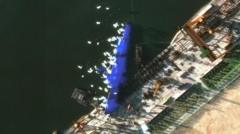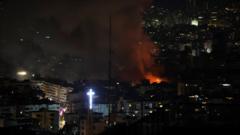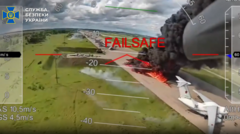Israeli air strikes in Beirut's southern suburbs aim at Hezbollah's drone operations, inflaming regional tensions just before Eid Al Adha, with significant reactions from Lebanese officials and community panic.
**Israel Launches Air Strikes on Southern Beirut Ahead of Eid Al Adha Celebrations**

**Israel Launches Air Strikes on Southern Beirut Ahead of Eid Al Adha Celebrations**
Tensions escalate as Israeli forces target Hezbollah's drone facilities, disregarding ceasefire.
Israel has conducted air strikes in the southern suburbs of Beirut, targeting what it claims to be Hezbollah's drone production facilities. This military action occurred late on Thursday, coinciding with the eve of the important Islamic holiday, Eid Al Adha. Residents received evacuation warnings as the Israeli Defense Forces (IDF) identified a Hezbollah unit suspected of producing drones underground, allegedly financed by Iran. Initial reports suggest no injuries resulted from the bombardment.
The air strikes come despite an ongoing ceasefire that has been in place between Israel and Hezbollah for the last six months. Lebanese Prime Minister Nawaf Salam has expressed strong condemnation, labeling the strikes a "systematic and deliberate attack" on Lebanon's security and stability, particularly injurious given the potential for holiday tourism.
Panic spread through the populated area as thousands of residents complied with evacuation alerts, leading to significant traffic congestion. Plumes of smoke rose into the sky following the strikes, which Lebanese President Joseph Aoun described as a serious breach of international accords, emphasizing its occurrence just before a sacred holiday. The United Nations Special Coordinator for Lebanon criticized the strikes for invoking fear and destabilization during a time meant for celebration.
Israeli Defence Minister Israel Katz has publicly commended the military operation, asserting that Israel holds the Lebanese government accountable for ensuring the ceasefire is maintained. Katz noted Hezbollah's escalating drone usage, framing it as a direct threat to Israel, while asserting that the recent military actions were a necessary response to continuous violations by Hezbollah.
The Israeli military previously urged evacuations in specific neighborhoods identified as hosting Hezbollah infrastructure. Just prior to the strikes, a spokesman for the Israeli military reiterated these warnings on social media, underscoring the command for civilians to leave the danger zones.
The ongoing conflict between Israel and Hezbollah has seen significant escalation over recent months, particularly after Israel's thorough military operations in southern Lebanon between 2023 and 2024. While Israeli strikes have reportedly inflicted heavy civilian casualties and displacement within Lebanon, Hezbollah's responses have also contributed to rising tensions. The ceasefire agreement established in late November did not include Hezbollah, and the underlying issues contributing to the conflict remain unresolved.
In recent months, Israel has carried out several air strikes in Lebanon, targeting entities it associates with Hezbollah, leading to increased tensions and calls from Lebanese authorities asserting that Israeli actions are in violation of the agreed-upon terms that were expected to promote stability in the border regions.
The air strikes come despite an ongoing ceasefire that has been in place between Israel and Hezbollah for the last six months. Lebanese Prime Minister Nawaf Salam has expressed strong condemnation, labeling the strikes a "systematic and deliberate attack" on Lebanon's security and stability, particularly injurious given the potential for holiday tourism.
Panic spread through the populated area as thousands of residents complied with evacuation alerts, leading to significant traffic congestion. Plumes of smoke rose into the sky following the strikes, which Lebanese President Joseph Aoun described as a serious breach of international accords, emphasizing its occurrence just before a sacred holiday. The United Nations Special Coordinator for Lebanon criticized the strikes for invoking fear and destabilization during a time meant for celebration.
Israeli Defence Minister Israel Katz has publicly commended the military operation, asserting that Israel holds the Lebanese government accountable for ensuring the ceasefire is maintained. Katz noted Hezbollah's escalating drone usage, framing it as a direct threat to Israel, while asserting that the recent military actions were a necessary response to continuous violations by Hezbollah.
The Israeli military previously urged evacuations in specific neighborhoods identified as hosting Hezbollah infrastructure. Just prior to the strikes, a spokesman for the Israeli military reiterated these warnings on social media, underscoring the command for civilians to leave the danger zones.
The ongoing conflict between Israel and Hezbollah has seen significant escalation over recent months, particularly after Israel's thorough military operations in southern Lebanon between 2023 and 2024. While Israeli strikes have reportedly inflicted heavy civilian casualties and displacement within Lebanon, Hezbollah's responses have also contributed to rising tensions. The ceasefire agreement established in late November did not include Hezbollah, and the underlying issues contributing to the conflict remain unresolved.
In recent months, Israel has carried out several air strikes in Lebanon, targeting entities it associates with Hezbollah, leading to increased tensions and calls from Lebanese authorities asserting that Israeli actions are in violation of the agreed-upon terms that were expected to promote stability in the border regions.




















